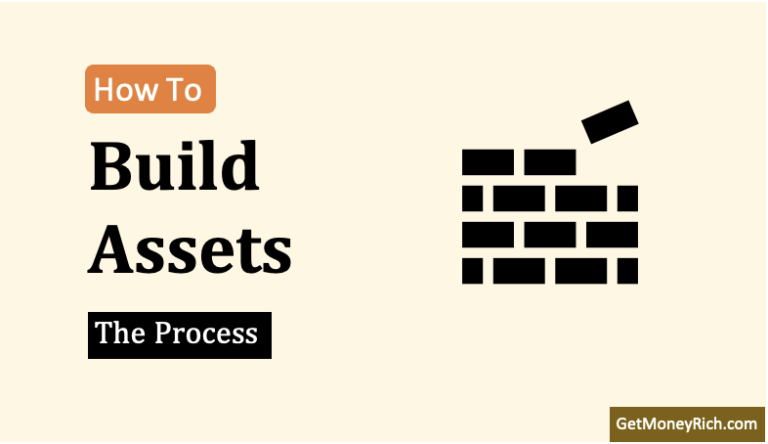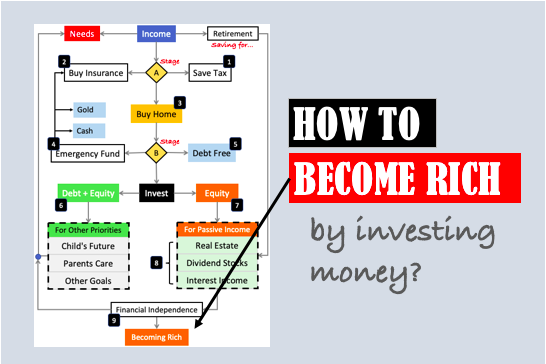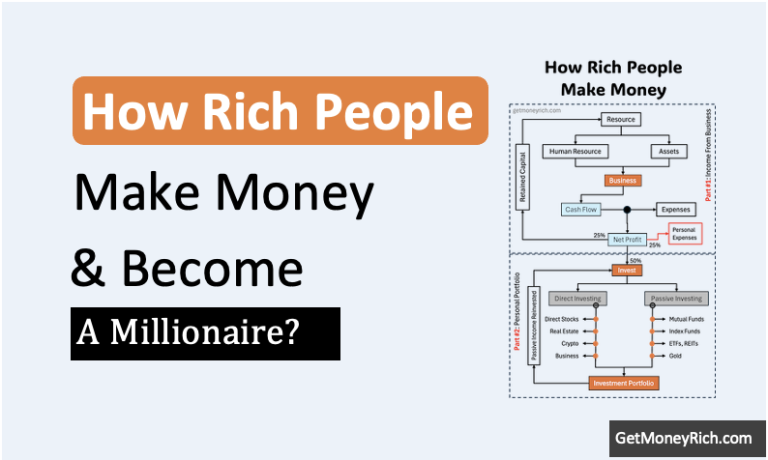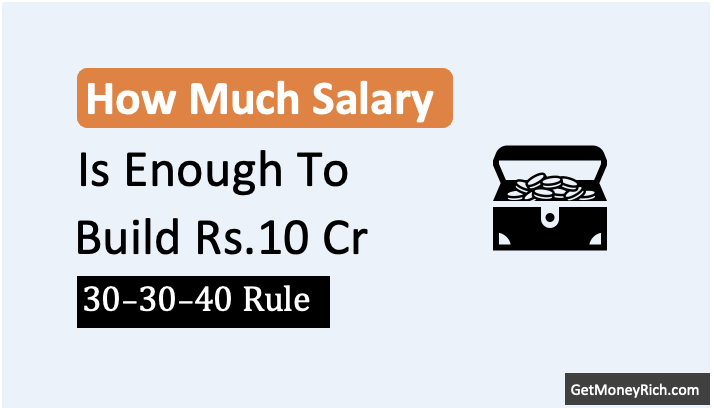Why do poor people, like so many of our own folks, stay stuck in that rut, while the rich just keep piling up more and more? It’s a heavy topic, but it’s one we’ve all seen play out in our lives. Whether it’s the chaiwala on the corner barely scraping by or the big-shot industrialist buying his third vacation home in Goa, the fact is in front of us. I’ve been thinking about this a lot, and honestly, it’s a mix of things. There are some stuff we can control, some we can’t, and a lot of it’s just woven into the fabric of how our world runs.
Allow me to present to you my understanding of why poor stay poor and rich work on the inverse.
The Game’s Already Fixed?
You know how it is, money makes money.
If you’ve got a lakh or two lying around, you can toss it into a fixed deposit, buy some shares, or even start a small side hustle. That cash starts growing, almost like magic (compounding).
But if you’re a daily wage worker in Mumbai or a farmer in Punjab, where’s that extra lakh coming from? Your whole salary’s gone before the month ends, rent, dal-chawal, kids’ school fees. Forget investing; you’re just trying to keep your head above water.
I remember my cousin Vinod, who drives an auto in Delhi. He told me once, “Bhaiya, I can barely make 800 rupees a day if I’m lucky, but after fuel and rent, I’m left with maybe 200. How do I save?”
Meanwhile, the guy who owns the flat he rents? He’s sitting pretty, collecting 3,000 a month from Vinod and ten other tenants, probably sipping coffee in a fancy café while the money rolls in.
That’s the thing, the rich have assets that work for them, while the poor are stuck working for every paisa.
Schooling Makes The Difference
Growing up in India, we’ve all heard it: “Padhai karo, beta, life ban jayegi.”
But let’s be real, not every kid gets the same shot at that dream. My former colleague’s son goes to a government school where the teacher shows up half the time, and the classroom’s falling apart.
Compare that to the elite schools in Lutyens’ Delhi or South Bombay, AC classrooms, fancy labs, and teachers who actually care. Those kids aren’t just learning math; they’re learning how to network, how to communicate effectively, how to crack IIT or IIM.
For the poor, even getting to college is a battle, coaching classes cost a fortune, and who’s got time to study when you’re helping your parents sell vegetables at the mandi?
Our main Priya tried so hard to get her son into a good engineering college, but they couldn’t afford the fees, even with a loan. Meanwhile, the rich kids glide into private universities or fly off to the US, their futures practically guaranteed.
It’s not just about hard work, it’s about what you’re born into.
Connections Matter More Than You Think
You ever notice how the big jobs, those cushy corporate gigs or startup funding, seem to go to people who “know someone”?
In India, it’s all about jugaad and jaan-pehchaan. If your dad’s a businessman or your uncle’s a politician, doors open for you. Internships, recommendations, seed money for a new venture, it’s all there. I saw this firsthand when a college buddy of mine got a job at a top firm because his dad golfed with the CEO. No kidding.
But for someone like my old schoolmate Ravi, whose parents run a tiny kirana store in our hometown? He’s never even met someone who works in an office, let alone someone who could hook him up. The poor don’t have that social circle, it’s just them, their family, and maybe a few neighbors, all hustling the same way. No VIP pass, no shortcuts.
Living Costs Hit Harder When You’re Poor
Life’s expensive, yaar, especially if you’re starting from zero.
Rent in cities like Bangalore or Pune is insane, 25,000 rupees for a 1BHK in a decent area. If you’re earning 35,000 a month, what’s left after that? Add in transport, food, and maybe a doctor’s visit if you’re unlucky, and you’re broke.
I’ve seen a few of my maids, skip meals just to pay her son’s school fees. One emergency, like her husband falling sick, wipes out everything she’s saved.
The rich, though? They’ve got properties they bought years ago that are now worth crores. They’re not sweating rent; they’re collecting it. Inflation might pinch them a little, but it’s the poor who feel the real burn when the cost of dal-roti jumps from Rs.20 to Rs.30 a plate.
It’s like the system’s designed to keep you running in place if you’re starting low.
Then There is Also A Mindset Trap
Okay, this one’s tricky, and I don’t want to sound like I’m blaming anyone.
But growing up poor does something to you. I’ve head my contractors saying, “Bas, din bhar ka kharcha nikal jaye, enough hai.” It’s that survival mode, focus on today, because tomorrow’s too far off to plan for.
When every rupee’s spoken for, you’re not thinking about stock, mutual funds or a side gig. You’re just praying the landlord doesn’t hike the rent.
The rich, though? They’ve got the luxury of dreaming big. They can take a loan to start a business because they’ve got collateral, or mummy-papa to bail them out if it flops.
I met this guy at a wedding once, some NRI type, who casually mentioned he “lost a crore” on a failed startup but was “trying again.” A crore? Vinod would faint if he even saw that much money, let alone losing it.
That confidence, that safety net, it’s a rich-person thing.
The Government’s Role – Help or Hype?
We’ve all heard the promises, Garibi Hatao, free rations, housing schemes.
And sure, some of it helps, like the 5 kilos of rice people gets through PDS. But does it really pull people out of poverty? Not when wages are stuck and jobs are scarce.
Meanwhile, the tax breaks and subsidies often go to big corporations or the well-connected. Ever wonder why a billionaire gets a loan written off while a farmer’s stuck begging for a waiver?
Look at GST, small traders like a value stockist, got hammered, while the big players adjusted just fine. The system’s tilted, and we can do nothing about it.
It’s not about handouts; it’s about giving the poor a real shot, better schools, fair wages, affordable healthcare. Until then, it’s the same old story. No about of PDS can take people get out of poverty.
It’s a Cycle, Not a Straight Line
I’ll say, all this stuff feeds into itself.
If one is poor, he/she can’t afford good education. No education, no good job. No job, no savings. No savings, no way out.
Meanwhile, the rich kid gets the best of everything, lands a cushy gig, and builds a fortune. It’s not always about laziness, sometimes it’s just about where you start.
I think about a family whom I know very closely. Their grandparents were farmers, barely literate. The father of the family clawed his way to a clerk’s job. His child is a doctor and is doing okay now, but it took generations, and a lot of luck, to move the needle.
For every story like this, there are a hundred others still waiting for that break.
Conclusion
I don’t have all the answers, its true, but I know this much, it’s not just about “working harder.”
We need schools that provide quality education for everyone, not just the elite. We need jobs that pay enough to live, not just survive. And maybe, just maybe, a system that doesn’t let the rich write all the rules.
It’s a tall order, but if we don’t talk about it, nothing changes.
What do you think about it? Ever seen this play out in your own life? Write your perspective in the comment section below.
Have a happy investing.
Suggested Reading:





